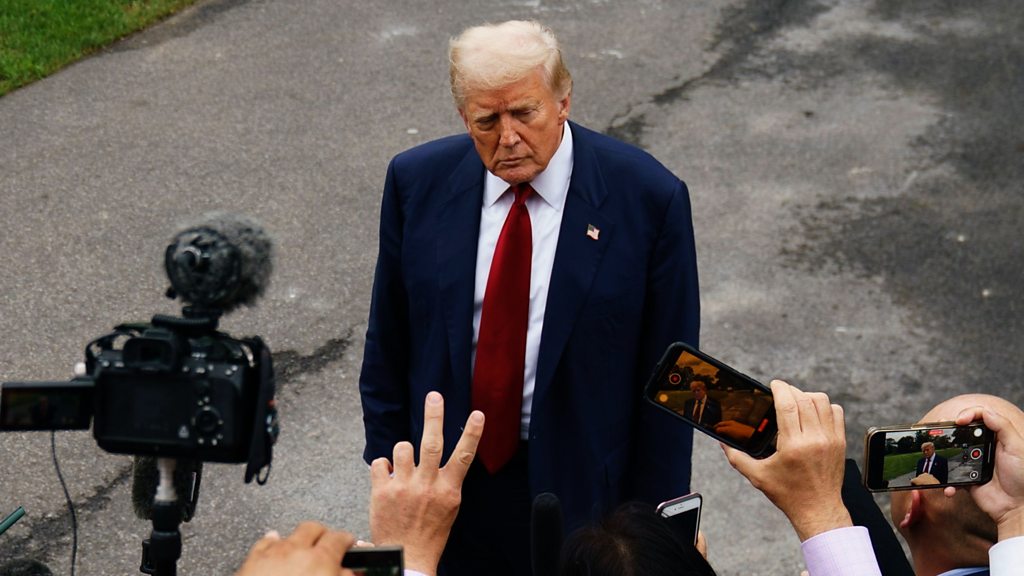Trump fires lead official on economic data as tariffs cause market drop
US President Donald Trump has fired the boss of one of America's most important economic institutions hours after weaker-than-expected jobs data stoked further alarm about his tariff policy.

On social media Trump claimed that Erika McEntarfer, commissioner of the Bureau of Labor Statistics (BLS), had "RIGGED" jobs figures "to make the Republicans, and ME, look bad".
The unprecedented move by the White House sparked accusations that Trump was politicising economic data.
The Senate's top Democrat, Chuck Schumer, said the president was "a bad leader" who "shoots the messenger" for weak statistics.
US stock markets were rattled on Friday after Trump, a Republican, forged ahead with his plans to raise import tariffs on goods from countries around the world.
Figures were then released by BLS showing that employers in the US added just 73,000 jobs in July, far below forecasts of 109,000 new roles.
The agency also revised down employment growth in May and June, reporting 250,000 fewer jobs than previously thought. It was the largest downward revision in employment figures - apart from the Covid-era - since 1979.
It is not unusual for the BLS to amend jobs figures as more data comes to light, however. During Joe Biden's presidency, statistics for 12 months over 2023-4 were retroactively revised downward by 818,000 jobs.
Though this month's changes were much larger than usual, analysts said the updates were consistent with other data showing slowdown.
The president posted on Truth Social on Friday: "The Economy is BOOMING under 'TRUMP.'"
But Heather Long, chief economist at the Navy Federal Credit Union, said the job figures were a "gamechanger", adding that "the labor market is deteriorating quickly" because of uncertainty caused by Trump's tariffs.
The president has dismissed concerns about his tariff plans, which he says will boost manufacturing in the US and rebalance global trade.
But data this week and a string of updates from companies on tariff costs have made those forecasts harder to ignore.
On the decision to sack McEntarfer, former US Treasury Secretary Larry Summers said: "Firing the head of a key government agency because you don't like the numbers they report, which come from surveys using long established procedures, is what happens in authoritarian countries, not democratic ones."
Friends of BLS, a group whose members include two former commissioners of the agency, said: "When leaders of other nations have politicized economic data, it has destroyed public trust in all official statistics and in government science."
McEntarfer called her time as commissioner "the honour of my life", while describing the agency's work as "vital and important".
Leading US stock market indices all closed sharply lower on Friday.
Trump has attacked key economic figures in the past, most recently Jerome Powell, chair of the US Federal Reserve, as the central bank continues to leave interest rates unchanged.
Trump is demanding a cut, but the Fed is holding fire until it sees the full impact of tariffs on the US economy.
In the aftermath of the jobs report, Trump launched a further salvo at Powell, stating he should also be put "out to pasture".
A member of the Fed's rate-setting committee, Adriana Kugler, is resigning early giving Trump an opportunity to install someone new. Her term was due to end next January.
The head of the Labour Department, which oversees the BLS, wrote on social media that the agency's deputy commissioner William Wiatrowski would step into the role during the search for a replacement.
The Labour Department did not immediately respond to a request for comment.
Some analysts speculated that the jobs data could reflect a hit to small businesses, which are typically slower to respond to surveys and are especially vulnerable to tariffs.
McEntarfer worked for the government for more than 20 years before being nominated by Biden to lead the BLS in 2023. She was later confirmed near unanimously by the US Senate, including by current Vice-President JD Vance, who was then an Ohio senator.
Michael Strain, director of economic policy studies at the right-leaning American Enterprise Institute, defended Entarfer, saying she had conducted herself with "great integrity".
"It is imperative that decisionmakers understand that government statistics are unbiased and of the highest quality. By casting doubt on that, the President is damaging the United States," he wrote on social media.
Jed Kolko, a senior fellow at the Peterson Institute for International Economics, said the firing raised serious alarm.
"For six months, I've said that threats to economic data have been more collateral damage than intentional harm. No longer. Firing the head of the BLS is five-alarm intentional harm to the integrity of US economic data and the entire statistical system," he wrote on social media.
Trump defended the decision and said her departure was needed to ensure there were "people that we can trust" in these posts.
"Why should anybody trust numbers?" the president told reporters when leaving the White House on Friday.
"I believe the numbers were phony, just like they were before the election, and there were other times - so you know what I did? I fired her, and you know what I did? The right thing."
Tariffs
The fight over data comes as Trump remakes trade policy, hitting goods from countries around the world with new tariffs ranging from 10% to 50%.
When Trump put forward similar plans in April, shares in the US tumbled more than 10% in a week as concerns spread to the dollar and bond markets.
The stock market recovered after he suspended some of the most drastic measures, leaving in place a less punishing, more expected 10% levy. In recent weeks, indexes in the US have been trading around all-time highs.
The latest measures are less extreme than what Trump first put forward in April, but they will still push the average tariff rate to roughly 17%, up from less than 2.5% at the start of the year.
"The reality is Trump got emboldened by the fact that markets came right back," Michael Gayed, a portfolio manager for The Free Markets ETF, told the BBC's Opening Bell. "Now he's going to try his luck again."
-BBC







